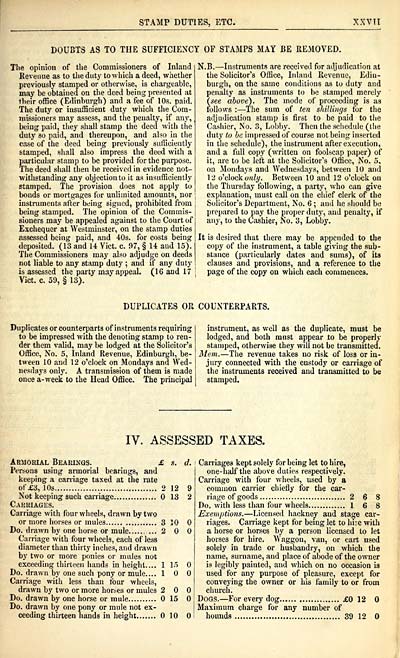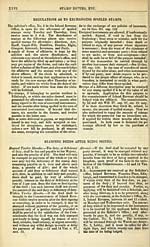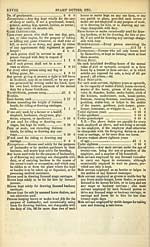Download files
Complete book:
Individual page:
Thumbnail gallery: Grid view | List view

STAMP DUTIES, ETC.
XXVTI
DOUBTS AS TO THE SUFFICIENCY OF STAMPS MAY BE REMOVED.
Tlie opinion of the Commissioners of Inland
Kevenne as to the duty to which a deed, whether
previously stamped or otherwise, is chargeable,
may be obtained on the deed being presented at
their office (Edinburgh) and a fee of 10s. paid.
The duty or insufficient duty which the Com-
missioners may assess, and the penalty, if any,
being paid, they shall stamp the deed with the
duty .so paid, and thereupon, and also in the
case of the deed being previously sufficiently
stamped, shall also impress the deed with a
particular stamp to be provided for the purpose.
The deed shall then be received in evidence not-
withstanding any objection to it as insufficiently
stamped. Tlie provision does not apply to
bonds or mortgages for unlimited amounts, nor
instruments after being signed, prohibited from
being stamped. The opinion of the Commis-
sioners may be appealed against to the Court of
Exchequer at Westminster, on the stamp duties
assessed being paid, and 40s. for costs being
deposited. (13 and 14 Vict. c. 97, § 14 and 15).
The Commissioners may also adjudge on deeds
not liable to any stamp duty ; and if any duty
is assessed the party m.ay appeal. (16 and 17
Vict. c. 59, § 13).
N.B. — Instruments are received for adjudication at
the Solicitor's Office, Inland Revenue, Edin-
burgh, on the same conditions as to duty and
penalty as instruments to be stamped merely
(see above). The mode of proceeding is as
follows : — The sum of fen shillings for the
adjudication stamp is first to be paid to the
Cashier, No. 3, Lobt)y. Then the scliedule (the
duty to be impressed of course not being inserted
in the schedule), the instrument after execution,
and a full copy (written on foolscap paper) of
it, are to be left at the Solicitor's Office, No. 5,
on Mondiiys and Wednesdays, between 10 and
12 o'clock owZ^. Between 10 and 12 o'clock on
the Thursday following, a partj^, who can give
explanation, must call on the cliief clerk of the
Solicitor's Department, No. 6 ; and he should be
prepared to pay the proper duty, and penalty, if
any, to the Cashier, No. 3, Lobby.
It is desired that there may be appended to the
copy of the instrument, a table giving the sub-
stance (particularly dates and sums), of its
clauses and provisions, and a reference to the
page of tiie copy on which each commences.
DUPLICATES OR COUNTERPARTS.
Duplicates or counterparts of instruments requiring
to be impressed with the denoting stamp to ren-
der them valid, may be lodged at the Solicitor's
Office, No. 5, Inland Revenue, Edinburgh, be-
tween 10 and 12 o'clock on Mondays and Wed-
nesdays only. A transmission of them is made
once a- week to the Head Office. The principal
instrument, as well as the duplicate, must be
lodged, and both must appear to be properly
stamped, otherwise they will not be transmitted.
Mem. — The revenue takes no risk of loss or in-
jury connected with the custody or carriage of
the instruments received and transmitted to be
stamped.
IV. ASSESSED TAXES.
Armorial Beaeinqs. £ s.
Persons using armorial bearings, and
keeping a carriage taxed at the rate
of £3, 10s 2 12
Not keeping such carriage 13
Cakiuages.
Carriage with four wheels, drawn by two
or more horses or mules 3 10
Do. drawn by one horse or mule 2
Carriage with four wheels, each of less
diameter than thirty inches, and drawn
by two or more ponies or mules not
exceeding thirteen hands in height.... 1 15
Do. drawn by one such pony or mule.... 1
Carriage with less than four wheels,
drawn by two or more hor^^es or mules 2
Do. drawn by one horse or mule 15
Do. drawn by one pony or mule not ex-
ceeding thirteen hands in height 10
Carriages kept solely for being let to hire,
one-half the above duties respectively.
Carriage with four wheels, used by a
common carrier chiefly for the car-
riage of goods 2 6 8
Do. with less than four wheels 16 8
Exemptions. — Licensed hackney and stage car-
riages. Carriage kept for being let to hire with
a horse or horses by a person licensed to let
horses for hire. Waggon, van, or cart used
solely in trade or husbandry, on which the
name, surname, and place of abode of the owner
is legibly painted, and which on no occasion is
used for any purpose of pleasure, except for
conveying the owner or his family to or from
church.
Dogs. — For every dog £0 12
Maximum cliarge for any number of
hounds 39 12
XXVTI
DOUBTS AS TO THE SUFFICIENCY OF STAMPS MAY BE REMOVED.
Tlie opinion of the Commissioners of Inland
Kevenne as to the duty to which a deed, whether
previously stamped or otherwise, is chargeable,
may be obtained on the deed being presented at
their office (Edinburgh) and a fee of 10s. paid.
The duty or insufficient duty which the Com-
missioners may assess, and the penalty, if any,
being paid, they shall stamp the deed with the
duty .so paid, and thereupon, and also in the
case of the deed being previously sufficiently
stamped, shall also impress the deed with a
particular stamp to be provided for the purpose.
The deed shall then be received in evidence not-
withstanding any objection to it as insufficiently
stamped. Tlie provision does not apply to
bonds or mortgages for unlimited amounts, nor
instruments after being signed, prohibited from
being stamped. The opinion of the Commis-
sioners may be appealed against to the Court of
Exchequer at Westminster, on the stamp duties
assessed being paid, and 40s. for costs being
deposited. (13 and 14 Vict. c. 97, § 14 and 15).
The Commissioners may also adjudge on deeds
not liable to any stamp duty ; and if any duty
is assessed the party m.ay appeal. (16 and 17
Vict. c. 59, § 13).
N.B. — Instruments are received for adjudication at
the Solicitor's Office, Inland Revenue, Edin-
burgh, on the same conditions as to duty and
penalty as instruments to be stamped merely
(see above). The mode of proceeding is as
follows : — The sum of fen shillings for the
adjudication stamp is first to be paid to the
Cashier, No. 3, Lobt)y. Then the scliedule (the
duty to be impressed of course not being inserted
in the schedule), the instrument after execution,
and a full copy (written on foolscap paper) of
it, are to be left at the Solicitor's Office, No. 5,
on Mondiiys and Wednesdays, between 10 and
12 o'clock owZ^. Between 10 and 12 o'clock on
the Thursday following, a partj^, who can give
explanation, must call on the cliief clerk of the
Solicitor's Department, No. 6 ; and he should be
prepared to pay the proper duty, and penalty, if
any, to the Cashier, No. 3, Lobby.
It is desired that there may be appended to the
copy of the instrument, a table giving the sub-
stance (particularly dates and sums), of its
clauses and provisions, and a reference to the
page of tiie copy on which each commences.
DUPLICATES OR COUNTERPARTS.
Duplicates or counterparts of instruments requiring
to be impressed with the denoting stamp to ren-
der them valid, may be lodged at the Solicitor's
Office, No. 5, Inland Revenue, Edinburgh, be-
tween 10 and 12 o'clock on Mondays and Wed-
nesdays only. A transmission of them is made
once a- week to the Head Office. The principal
instrument, as well as the duplicate, must be
lodged, and both must appear to be properly
stamped, otherwise they will not be transmitted.
Mem. — The revenue takes no risk of loss or in-
jury connected with the custody or carriage of
the instruments received and transmitted to be
stamped.
IV. ASSESSED TAXES.
Armorial Beaeinqs. £ s.
Persons using armorial bearings, and
keeping a carriage taxed at the rate
of £3, 10s 2 12
Not keeping such carriage 13
Cakiuages.
Carriage with four wheels, drawn by two
or more horses or mules 3 10
Do. drawn by one horse or mule 2
Carriage with four wheels, each of less
diameter than thirty inches, and drawn
by two or more ponies or mules not
exceeding thirteen hands in height.... 1 15
Do. drawn by one such pony or mule.... 1
Carriage with less than four wheels,
drawn by two or more hor^^es or mules 2
Do. drawn by one horse or mule 15
Do. drawn by one pony or mule not ex-
ceeding thirteen hands in height 10
Carriages kept solely for being let to hire,
one-half the above duties respectively.
Carriage with four wheels, used by a
common carrier chiefly for the car-
riage of goods 2 6 8
Do. with less than four wheels 16 8
Exemptions. — Licensed hackney and stage car-
riages. Carriage kept for being let to hire with
a horse or horses by a person licensed to let
horses for hire. Waggon, van, or cart used
solely in trade or husbandry, on which the
name, surname, and place of abode of the owner
is legibly painted, and which on no occasion is
used for any purpose of pleasure, except for
conveying the owner or his family to or from
church.
Dogs. — For every dog £0 12
Maximum cliarge for any number of
hounds 39 12
Set display mode to: Large image | Transcription
Images and transcriptions on this page, including medium image downloads, may be used under the Creative Commons Attribution 4.0 International Licence unless otherwise stated. ![]()
| Scottish Post Office Directories > Towns > Edinburgh > Post Office Edinburgh and Leith directory > 1855-1856 > (35) |
|---|
| Permanent URL | https://digital.nls.uk/83112000 |
|---|
| Description | Directories of individual Scottish towns and their suburbs. |
|---|
| Description | Around 700 Scottish directories published annually by the Post Office or private publishers between 1773 and 1911. Most of Scotland covered, with a focus on Edinburgh, Glasgow, Dundee and Aberdeen. Most volumes include a general directory (A-Z by surname), street directory (A-Z by street) and trade directory (A-Z by trade). |
|---|


